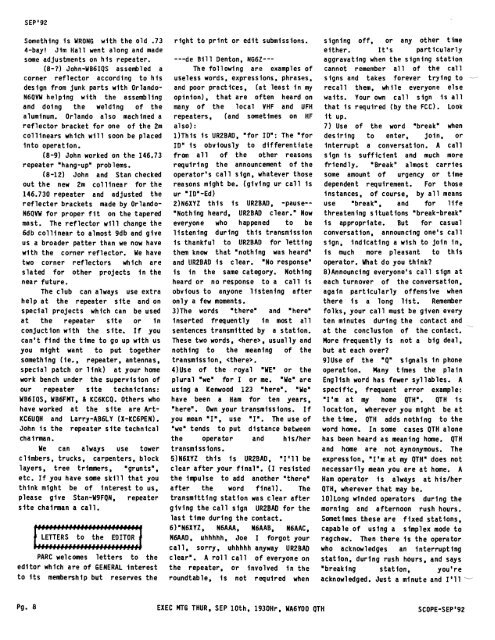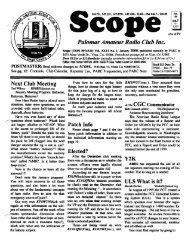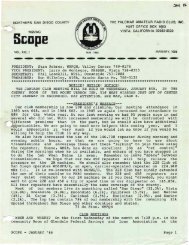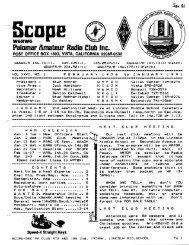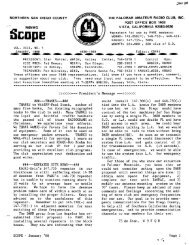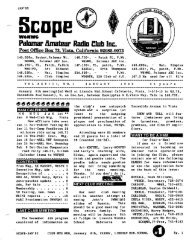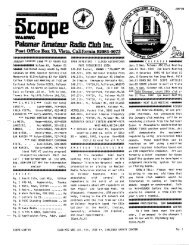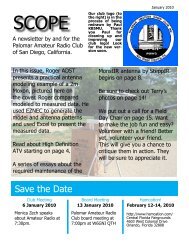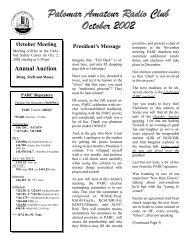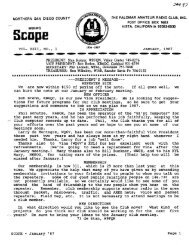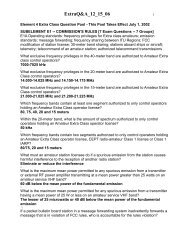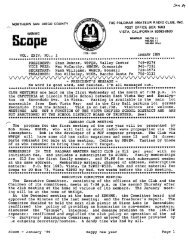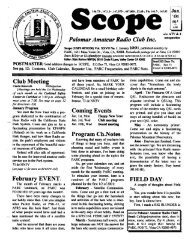1992 - Palomar Amateur Radio Club
1992 - Palomar Amateur Radio Club
1992 - Palomar Amateur Radio Club
You also want an ePaper? Increase the reach of your titles
YUMPU automatically turns print PDFs into web optimized ePapers that Google loves.
SEP'92<br />
Something is WRONG with the old .73<br />
4-bay! Jim Hall went along and made<br />
some adjustments on his repeater.<br />
(8-?) John-WB6IQS assembled a<br />
corner reflector according to his<br />
design from junk parts with Orlando<br />
N6QVW helping with the assembling<br />
and doing the welding of the<br />
aluminum. Orlando also machined a<br />
reflector bracket for one of the 2m<br />
collinears which will soon be placed<br />
into operation.<br />
(8-9) John worked on the 146.73<br />
repeater "hang-up" problems.<br />
(8-12) John and Stan checked<br />
out the new 2m collinear for the<br />
146.730 repeater and adjusted the<br />
reflecter brackets made by Orlando<br />
N6QVW for proper fit on the tapered<br />
mast. The reflector will change the<br />
6db collinear to almost 9db and give<br />
us a broader patter than we now have<br />
with the corner reflector. We have<br />
two corner reflectors which are<br />
slated for other projects in the<br />
nea r future.<br />
The club can always use extra<br />
help at the repeater site and on<br />
special projects which can be used<br />
at the repeater site or in<br />
conjuction with the site. If you<br />
can't find the time to go up with us<br />
you might want to put together<br />
something (ie•• repeater. antennas.<br />
special patch or link) at your home<br />
work bench under the supervision of<br />
our repeater site technicians:<br />
WB6IQS. WB6FMr. &KC6KCQ. Others who<br />
have worked at the site are Art<br />
KC6UQH and Larry-AB6LY (X-KC6PEN).<br />
John is the repeater site technical<br />
chairman.<br />
We can always use tower<br />
climbers, trucks. carpenters. block<br />
layers. tree trimmers. "grunts" ,<br />
etc. If you have some skill that you<br />
think might be of interest to us,<br />
please give Stan-W9FQN. repeater<br />
site chairman a call.<br />
LETTERS to the EDITOR<br />
... . ..a....... <br />
PARC welcomes letters to the<br />
editor which are of GENERAL interest<br />
to its membership but reserves the<br />
right to print or edit submissions.<br />
---de Bill Denton, NG6Z--<br />
The following are examples of<br />
useless words, expressions, phrases.<br />
and poor practices. (at least in my<br />
opinion), that are often heard on<br />
many of the local VHF and UFH<br />
repeaters, (and sometimes on HF<br />
also):<br />
l)This is UR2BAD. "for 10": The "for<br />
10" is obviously to differentiate<br />
from all of the other reasons<br />
requiring the announcement of the<br />
operator's call sign, whatever those<br />
reasons might be. (giving ur call is<br />
ur "ID"-Ed)<br />
2)N6XYZ this is UR2BAD. -pause-<br />
"Nothing heard. UR2BAD clear." Now<br />
everyone who happened to be<br />
listening during this transmission<br />
is thankful to UR2BAD for letting<br />
them know that "nothing was heard"<br />
and LlR2BAD is clear. ·No response"<br />
is in the same category. Nothing<br />
heard or no response to a call is<br />
obvious to anyone listening after<br />
only a few moments.<br />
3)The words "there" and "here"<br />
inserted frequently in most all<br />
sentences transmitted by a station.<br />
These two words. . usually and<br />
nothing to the meaning of the<br />
transmission. .<br />
4}Use of the royal "WE" or the<br />
plural ·we" for I or me. ·We" are<br />
using a Kenwood 123 "here". "We"<br />
have been a Ham for ten years.<br />
"here". Own your transmissions. If<br />
you mean "I", use "I". The use of<br />
"we" tends to put distance between<br />
the operator and his/her<br />
transmissions.<br />
5)N6XYZ this is UR2BAO, "I'll be<br />
clear after your final". (1 resisted<br />
the impulse to add another "there"<br />
after the word final). The<br />
transmitting station was clear after<br />
giving the call sign UR28AD for the<br />
last time during the contact.<br />
6)"N6XYZ. N6AAA. N6AAB. N6AAC.<br />
N6AAO. uhhhhh, Joe I forgot your<br />
call. sorry, uhhhhh anyway UR2BAD<br />
clear". A roll call of everyone on<br />
the repeater. or involved in the<br />
roundtable. is not required when<br />
Signing off, or any other time<br />
either. It's particularly<br />
aggravating when the signing station<br />
cannot remember all of the call<br />
signs and takes forever trying to<br />
recall them, while everyone else<br />
waits. Your own call sign is all<br />
that is required (by the FCC). Look<br />
it up.<br />
7) Use of the word "break" when<br />
desiring to enter, join. or<br />
interrupt a conversation. A call<br />
sign is sufficient and much more<br />
friendly. "Break" almost carries<br />
some amount of urgency or time<br />
dependent requirement. For those<br />
instances. of course. by all means<br />
use "break", and for life<br />
threatening situations "break-break"<br />
is appropriate. But for casual<br />
conversation. announcing one's call<br />
sign, indicating a wish to join in,<br />
is much more pleasant to this<br />
operator. What do you think?<br />
8)Announcing everyone's call sign at<br />
each turnover of the conversation,<br />
again particularly offensive when<br />
there is a long list. Remember<br />
folks, your call must be given every<br />
ten minutes during the contact and<br />
at the conclusion of the contact.<br />
More frequently is not a big deal,<br />
but at each over?<br />
9)Use of the "Q" signals in phone<br />
operation. Many times the plain<br />
English word has fewer syllables. A<br />
speCific. frequent error example:<br />
"I'm at my home QTH". QTH is<br />
location. wherever you might be at<br />
the time. QTH adds nothing to the<br />
word home. In some cases QTH alone<br />
has been heard as meaning horne. QTH<br />
and home are not aynonymous. The<br />
expression. "I'm at my QTH" does not<br />
necessarily mean you are at home. A<br />
Ham operator is always at his/her<br />
QTH, wherever that may be.<br />
10llong winded operators during the<br />
morning and afternoon rush hours.<br />
Sometimes these are fixed stations.<br />
capable of using a simplex mode to<br />
ragchew. Then there is the operator<br />
who acknowledges an interrupting<br />
station, during rush hours. and says<br />
"breaking station. you're<br />
acknowledged. Just a minute and I'll<br />
Pg. 8 EXEC MrS THUR. SEP 10th, 1930Hr, WA6YOO QTH SCOPE-SEP'92


